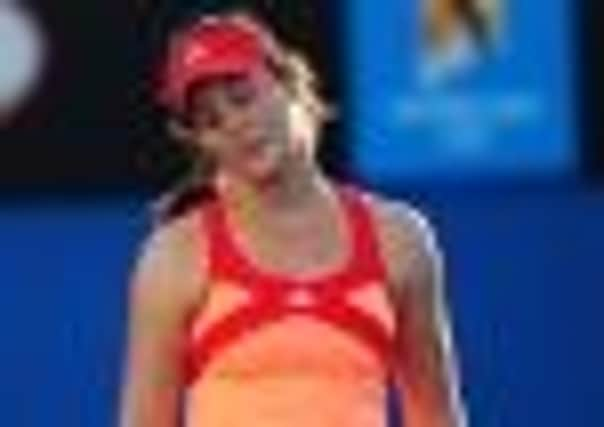Hope remains for British game despite poor show in Melbourne


Writing about the failure of British tennis in January is good practice for the final week of June.
Obituaries relaying the demise of the hopes of home players during Wimbledon fortnight are, more often than not, penned after either the first or second days’ play at the All England Club.
Advertisement
Hide AdAdvertisement
Hide AdThe counter from the Lawn Tennis Association, which has thrown good money after bad at the problem, is that more players are playing the sport and the gap to Andy Murray as the lone standard bearer is narrowing.
Such a response rarely washes.
This humiliation has been happening all too often at the nation’s favourite fortnight.
Britain has an abundance of players outside the top 100 and an array of exciting teenage prospects on the men’s and women’s side of the draw.
But every grass-court season, it is the same old story.
British player arrives full of hope, expectation and a smattering of trepidation and they are quickly and mercilessly dispensed of by more ruthless, talented, bolder opposition.
Advertisement
Hide AdAdvertisement
Hide AdNow, that humbling is being played out on other major international courts.
On Sunday came the hope that with four British players gaining entry to the first grand slam of the year, and Laura Robson and James Ward safely negotiating the qualifying rounds to join them, there would at last be something more to write home about for the nation’s tennis scribes.
Yesterday came the realisation that British tennis should be re-christened the Institute of False Dawns.
Five players went into action, five are heading home.
Anne Keothavong can be forgiven for an ill-timed bout of food poisoning.
And there are other mitigating circumstances.
Advertisement
Hide AdAdvertisement
Hide AdRobson and Heather Watson, teenagers both, were up against seeded players in Jelena Jankovic and Victoria Azarenka respectively.
And let us not forget it was red hot out there in Melbourne. And blustery.
Hardly British. Hardly cricket.
But come on, not a set won from the four who attempted to go something resembling the distance.
Robson and Watson managed just three games between them.
And Ward lost in straight sets to Slovenian Blaz Kavcic, ranked 103rd in the world.
Advertisement
Hide AdAdvertisement
Hide AdBaltacha’s defeat summed up the malaise British tennis continues to find itself in.
The Scot has risen to 54th in the world, a ranking that should require of her the minimum of a second-round appearance – and a feat she managed on her last three visits to Australia. But Britain’s leading female player lost to Stephanie Foretz Gacon, who is ranked 53 places below her.
So Murray was last night left to fight a lone battle, to defend or criticise the LTA whichever stance interests him, and steer Britain towards respectability over the coming fortnight.
There is light at the end of the tunnel. The money being pumped in is creating some promise.
Advertisement
Hide AdAdvertisement
Hide AdBeverley’s Kyle Edmund, 17, is a Junior Davis Cup winner and one of a quartet of teenage boys all ready to make the step up from junior to senior ranks.
The powerful right-hander was a semi-finalist at the US Open boys tournament last year and as the No 29-ranked junior in the world will look to continue punching above his weight in the boys’ singles in Melbourne from next Monday.
George Morgan reached last year’s Australian Open boys final, Liam Broady the Wimbledon equivalent, while Oliver Golding went one better and won the US Open junior crown in September.
Edmund is the youngest and the one tipped to go the furthest.
Advertisement
Hide AdAdvertisement
Hide AdI spoke to Edmund before he took a three-man team out to Mexico in the autumn to win the Junior Davis Cup.
Confident and powerful, determined and focused, he has all the traits of a young man capable of making his mark on the world of tennis.
He and his colleagues need nurturing properly by the LTA.
They need a steady integration from junior into senior tournaments.
Robson and Watson have been rushed. It is almost as if the thinking is that if Russian teenage girls are world beaters, why can’t ours be?
Advertisement
Hide AdAdvertisement
Hide AdIt is not that simple. British tennis players need to learn what it is like to win, even on the second-tier circuits in front of a handful of people, before they can carry that mentality onto the sport’s grandest stages.
There is hope for tennis because sport is cyclical. Just look at cycling. Six years ago Britain was nowhere on the track and the road. Now we have some of the most marketable names in the sport.
It is all about talent being harnessed in the correct manner.
Otherwise the same old stories slamming the LTA and Britain’s dearth of talent will be trotted out grand slam after grand slam.
Rusedski sympathises with Britons
Advertisement
Hide AdAdvertisement
Hide AdGreg Rusedski conceded the opening day of the year’s first grand slam had been a let-down from a British perspective, but said he had sympathy with some of those heading home early.
Four women and one man crashed out of the Australian Open without winning a set between them,
The former British No 1, who was a US Open finalist in 1997, said: “It is a little bit disappointing but also some of the girls had tough match-ups.
“If you look at Robson she was playing Jankovic, a former No 1 in the world, ranked No 13; Azarenka has been in great form so that was a tough match for Heather Watson to win.
“And James Ward did a good job to qualify for the Australian Open and actually had a match that was winnable so he’ll be a little bit disappointed.”